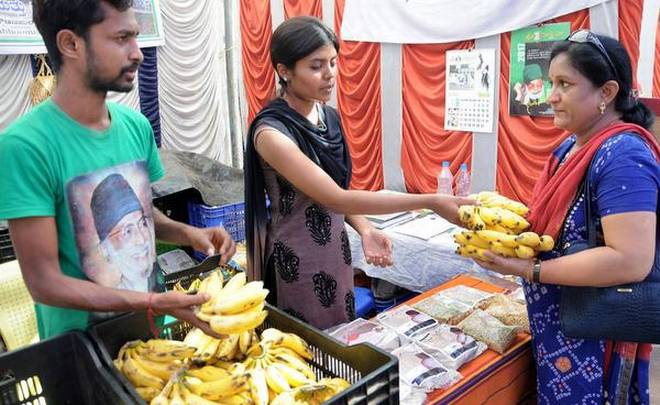
With a catchphrase “Raitharindha Grahakarige” (from farmers to consumers), young and educated farmers practising chemical-free agriculture, are making use of the ongoing Bahuroopi international multilingual theatre festival as a “forum” to push their “vision” and “mission.” These second generation farmers wish to market chemical-free and pesticide-free farm produce directly to the consumers and eventually become “entrepreneurs.”
A stall has been put up by them at Bahuroopi where they have been marketing their produce, explaining the importance of the produce and how they have cultivated them the natural way as popularised by Subhash Palekar. Be it Kempakki (a red rice variety) or Amaranthus seeds (which are rich in nutrition) or toor dal and ragi grown naturally, the young farmers — some of them who have just passed out of college and want to step into their fathers’ shoes — have managed to draw the attention of those visiting the festival. Identified with Amrita Bhoomi, a charitable trust and an international centre for sustainable development, which is managed by Chukki Nanjundaswamy, daughter of veteran farmer leader M.D. Nanjundaswamy, they launched the initiative of taking farmers’ produce to the consumers here on December 25 last year.
The naturally grown produce is available in front of Kukkarahalli Lake here every Sunday from 7 a.m. to 10 a.m. Abhilash, a BA graduate farmer from Hosamalangi village in Kollegal taluk, whose father Rechanna won the prestigious Plant Genome Saviour Community Award in New Delhi in December last for preserving exotic paddy varieties, says, “I want to make it big like my father. I want to produce seeds and distribute it among fellow farmers.” Abhilash has grown Kempakki — which he claims “has medicinal value and is good for joint aches.” Inspired by Mr. Palekar, Naveen Kumar B.I. from Hassan district has cultivated yelakki banana using the “zero farming” method. Similarly, Raghu from Jyothigowdanapura and Mallikarjun from Hondarabalu village have grown toor dal using the same method. Muttegowda has produced ragi, veggies and leafy veggies.
Tanuja, an MBA graduate from University of Mysore, whose father is a farmer in Kollegal taluk, assists them in their marketing on behalf of Amrita Bhoomi. As a steady stream of visitors throng the stall, Ms. Tanuja explains to them how different are the products sold at their stall from what is available elsewhere.
She explains the difference between the banana grown the usual way and that is grown the natural way, which is available at their stall. Since the start of Bahuroopi, over 500 kg of bananas have been sold.
She says Amaranthus seeds, which is the “secret behind the strength” of Soliga tribals and grown extensively by them, has found many takers.
First published by The Hindu